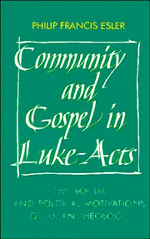Book contents
- Frontmatter
- Contents
- Acknowledgements
- List of abbreviations
- 1 The socio-redaction criticism of Luke–Acts
- 2 The community
- 3 Sectarian strategies
- 4 Table-fellowship
- 5 The law
- 6 The Temple
- 7 The poor and the rich
- 8 Rome and the ancestral theme
- Epilogue: community and Gospel
- Notes
- Index of biblical references
- Index of secondary authors
Epilogue: community and Gospel
Published online by Cambridge University Press: 10 January 2011
- Frontmatter
- Contents
- Acknowledgements
- List of abbreviations
- 1 The socio-redaction criticism of Luke–Acts
- 2 The community
- 3 Sectarian strategies
- 4 Table-fellowship
- 5 The law
- 6 The Temple
- 7 The poor and the rich
- 8 Rome and the ancestral theme
- Epilogue: community and Gospel
- Notes
- Index of biblical references
- Index of secondary authors
Summary
Some time during the late eighties or early nineties of the first century CE, a Christian community in a Hellenistic city of the Roman East was experiencing difficulties from within and opposition from without which threatened its continued existence and unity. Its predicament originated largely in the very mixed nature of the individuals who comprised its membership, the mixture generating tensions within the community and exposing it to the disturbing effects of various influences from the outside world. This mixed composition is illustrated by plotting its members along two fundamental axes. The first is the axis of their religious affiliation prior to becoming Christians, ranging from pagan idolatry on the one hand to conservative Judaism on the other. The second is the socio-economic axis, extending from the maximum possession of wealth, status and power enjoyed by the decurions and senior Roman military and administrative personnel to the total indigence of the city's beggars.
As for the first axis, few of the members of this community had been outright pagans prior to their conversion. The great majority of its Gentile membership had come from the ‘God-fearers’, those Gentiles who worshipped Yahweh as the one true God and attended synagogue services in furtherance of that worship. The community also contained a significant number of Jews.
- Type
- Chapter
- Information
- Community and Gospel in Luke-ActsThe Social and Political Motivations of Lucan Theology, pp. 220 - 223Publisher: Cambridge University PressPrint publication year: 1987



